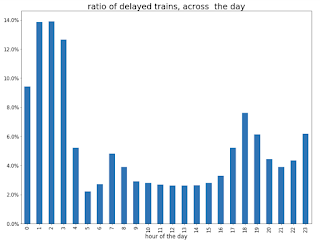Wednesday, 18 October 2017
Infinispan coming to Basel One 2017!
Tomorrow, 19th October, I’ll be presenting at Basel One 2017 a talk on "Streaming Data Analysis with Kubernetes", where I’ll be combining OpenShift, Infinispan and Vert.x to demonstrate how to process streaming data.
If you’re in Basel and want to find out more about these technologies, make sure you come! The talk is at 16:00 :D
Cheers, Galder
Tags: conference
Tuesday, 20 June 2017
Back from Berlin Buzzwords, video already available!
Exactly one week ago I was presenting a talk on big data in action with Infinispan and two days later the video has already been uploaded!! Fastest ever conference video release I’ve seen! Kudos to Berlin Buzzwords 👏
The slides for the talk can be found here, and the video is here:
Berlin Buzzwords was a very interesting conference. Similar to J On The Beach, it’s a conference focused on data related technologies, but Berlin Buzzwords had a more Apache focus. So, you had many talks on Solr, Lucene, Spark, Flink, Kafka, Beam…etc, as well as Apache spinoffs such as ElasticSearch.
The conference was very well organised and the talks were good, although I did miss some demos in the talks I attended. Having been presenting Infinispan for over 8 years, I am fully aware that coming up with data related demos is not an easy task. However, with some many open data streams available these days, there has never been a bigger opportunity to put some of that data to work in a live demo and demonstrate why your tech is so awesome.
From an Infinispan perspective, it was fascinating talking to Flink, Beam…etc developers and learn how Infinispan could be integrated with these projects. We already have Hadoop and Spark integrations, but we’re not standing still and we will continue to integrate with other popular data processing technologies.
On a personal level, it was awesome to meet William Benton once again and we had some very interesting discussions about Radanalytics, a project that helps you build data-driven applications on top of OpenShift. I also had some interesting chats with fellow Basel residents working for Baloise insurance group and the University of Basel.
Cheers, Galder
Tags: conference
Tuesday, 13 June 2017
Infinispan coming to Berlin Buzzwords 2017
Are you attending Berlin Buzzwords and want to find out more how Infinispan can help your systems react to real-time data quickly, and see the cool stuff we have for data analytics, make sure you come to my talk on Big Data In Action with Infinispan on Tuesday, 13th June at 16:30.
Cheers, Galder
Tags: conference
Sunday, 21 May 2017
J On The Beach: An unmissable conference for distributed computing tech!
J On The Beach was a blast! It’s only their second year doing the conference, but it was really well managed and it had an amazing lineup of speakers. To top that up, it was in Malaga so the good weather made it possible to stay outside in the garden at La Termica chatting to attendees and speakers.
The evening before the start of the conference, we had a welcome reception at the Ayuntamiento de Malaga learning about IT and Big Data promotion that the major and his team are helping with.
The conference started with a mind-blowing keynote on quantum computing by Eric Ladizinsky. It was a super talk with very interesting information about what the future might hold in terms of computing. The challenges of quantum computing are immense but the possibilities it opens up staggering as well.
That first morning I had the chance to see Kyle Kingsbury's Jepsen talk which was very entertaining. He gave an intro on Jepsen and looked back at the results of different distributed environments. This allowed the audience to get a good overview on what each system is capable of and what guarantees they provide. Also in the first day I attended, Christopher Meiklejohn's talk on Antidote, a geo-replicated NoSQL database with strong guarantees based on Riak. It uses CRDTs and Hight Available Transactions to achieve this.
On the second day I had my presentation on Functional Reactive Programming with Elm, Node.js and Infinispan. It was well received and got good feedback. Slides can be found here, and the demo repository is here. Unfortunately, due to scheduling and preparations for my talk, I couldn’t go to Duarte Dunes' ScyllaDB and Tyler Akidau’s Apache Beam talks, but I hope to catch those up when the videos are shared.
However, I was able to attend Caitie Mccaffrey's talk on Distributed Sagas, a protocol for coordinating microservices. Even though such protocol would be hard to implement in all situations, e.g. online ticket shop for a very popular artist, it had some interesting characteristics. The talk itself was delivered masterfully.
Finally, I was at Martin Thompson's High Performance Managed Languages talk which was superb! With years of experience and the development of Aeron on his back, he was able to give a interesting overview of the performance characteristics of managed vs unmanaged languages. Flexibility in managed languages, such as in C#, seems to be the best way to achieve the best performance.
All in all it was a fantastic conference, and I was delighted to have been part of it. Valo, the company behind J On The Beach were fantastic hosts and met some amazing people that are or had been part of this company, including: Luis, Justo, Michael, Danielle…etc.
I hope to come up another time :)
Cheers, Galder
Tags: conference
Thursday, 18 May 2017
Infinispan landed on J On The Beach 2017
Are you in Malaga for J On The Beach 2017 and want to know more about functional reactive programming with Elm, Node.js and Infinispan? Then, make sure you come to this talk on Friday, 11am at Mollete Hall. It’s a fun, live coding talk that you just can’t miss :)
Cheers, Galder
Tags: conference
Friday, 07 April 2017
In Memory Data Grid Patterns Demos from Devoxx France!
Devoxx France 2017 was a blast!! Emmanuel and I would like to thank all attendees to our in-memory data grids patterns talk. The room was full and we thoroughly enjoyed the experience!
During the talk we presented a couple of small demos that showcased some in-memory data grid use cases. The demos are located here, but I thought it’d be useful to provide some step-by-step here so that you can get them running as quickly as possible.
Before we start with any of the demos, it’s necessary to run some set up steps:
1. Check out git repository:
2. Download Infinispan Server 9.0.0.Final and at the same level as the git repository.
3. Go into the datagrid-patterns directory, start the servers and wait until they’ve started:
cd datagrid-patterns ./run-servers.sh
4. Install Anaconda for Python 3, this is required to run Jupyter notebook for plotting.
5. Install Maven 3.
Once the set up is complete, it’s time to start with the individual demos.
Both demos shown below work with the same application domain: rail transport systems. In this domain, we differentiate between physical stations, trains, station boards which are located in stations, and finally stops, which are individual entries in station boards.
Analytics Demo
The first demo is focused on how you can use Infinispan for doing offline analytics. In particular, this demo tries to answer the following question:
Q. What is the time of the day when there is the biggest ratio of delayed trains?
To answer this question, Infinispan data grid will be loaded with 3 weeks worth of data from station boards. Once the data is loaded, we will execute a remote server task which will use Infinispan Distributed Java Streams to calculate the two pieces of information required to answer the question: per hour, how many trains are going through the system, and out of those, how many are delayed.
An important aspect to bear in mind about this server tasks is that it will only be executed in one of the nodes in the cluster. It does not matter which one. In turn, this node will will ship the lambdas required to do the computation to each of the nodes so that they can executed against their local data. The other nodes will reply with the results and the node where the server task was invoked will aggregate the results.
Then, these results are sent back to the client, which in turn, stores the results as JSON in an intermediate cache. Once the results are in place, we will use a Jupyter notebook to read those results and plot the result.
Let’s see these steps in action:
1. First, we need to install the server tasks in the running servers above:
cd datagrid-patterns/analytics
mvn clean install package -am -pl analytics-server
mvn wildfly:deploy -pl analytics-server
2. Open the datagrid-pattern repo with your favourite IDE and run delays.java.stream.InjectApp class located in analytics/analytics-server project. This command will inject the data into the cache. On my environment, it takes between 1 and 2 minutes.
3. With the data loaded, we need to run the remote task that will calculate the total number of trains per hour and how many of those are delayed. To do that, execute delays.java.stream.AnalyticsApp class located in analytics/analytics-server project from your IDE.
4. You can verify that the results have been calculating by going to the following address:
5. With the results in place, it’s time to start the Jupyter notebook:
cd datagrid-patterns/analytics/analytics-jupyter
~/anaconda/bin/jupyter notebook
6. Once the notebook opens, click open live-demo.ipynb notebook and execute each of the cells in order. You should end up seeing a plot like this:
So, the answer to the question:
Q. What is the time of the day when there is the biggest ratio of delayed trains?
is 2am! That’s because last connecting trains of the day wait for each other to avoid leaving passengers stranded.
Real Time Demo
The second demo that we presented uses the same application domain as above, but this time we’re trying to use our data grid as a way of storing the station board state of each station at a given point in time. So, the idea is to use Infinispan as an in memory data grids for working with real time data.
So, what can we do with this type of data? In our demo, we will create a centralised dashboard of delayed trains around the country. To do that, we will take advantage of Infinispan’s Continuous Query functionality which allows us to find those station boards which contain stops that are delayed, and as new delayed trains appeared these will be pushed to our dashboard.
To run this demo, keep the same servers running as above and do the following:
-
Run delays.query.continuous.FxApp application located in real-time project inside the datagrid-patterns demo. This app will inject some live station board data and will launch a JavaFX dashboard that shows delayed trains as they appear. It should look something like this:
Conclusion
This has been a summary of the demos that we run in our talk at Devoxx France with the intention of getting you running these demos as quickly as possible. The repository contains more detailed information of these demos. If there’s anything unclear or any of the instructions above are not working, please let us know!
Thanks to Emmanuel Bernard for partnering with me for this Devoxx France talk and for the continuous feedback while developing the demos. Thanks as well to Tristan Tarrant for the input in the demos and many thanks to all Devoxx France attendees who attended our talk :)
A very special thanks to Alexandre Masselot whose "Swiss Transport in Real Time: Tribulations in the Big Data Stack" talk at Soft-Shake 2016 was the inspiration for these demos. @Alex, thanks a lot for sharing the demos and data with me and the rest of the community!!
In a just a few weeks I’ll be at Great Indian Developer Summit presenting these demos and much more! Stay tuned :)
Cheers,
Galder
Tags: conference devoxx demo streams query
Wednesday, 02 November 2016
Infinispan coming to Devoxx Morocco!
Tomorrow Thursday, 3rd November, I’ll be speaking at the Devoxx Morocco conference (Casablanca, Morocco) about writing apps in functional reactive programming style with Infinispan, Elm and Node.js. If you’re interested in the topic and live in the area, make sure you come to my talk!
To find out more, head to the Devoxx Morocco site, where you can find exact details about the rest of the programme, location…etc.
Cheers,
Galder
Tags: conference devoxx
Thursday, 26 May 2016
Back from GeeCON 2016
Thanks to everyone who attended the Distributed Streams with Infinispan talk at GeeCON 2016!! It was a blast to give the talk and although there was a small hiccup with one of the demos, I managed to fix it and the both demos were successfully delivered. The code from the demos can be found in this git repository, and the slides can be found here.
I presented at GeeCON back in 2011 and it was great to be back once again! The organizers keep doing an amazing job and can’t wait to come back. I particularly enjoyed how GeeCON was embracing other programming languages outside the Java Virtual Machine. For example, there were talks on Julia and Elm programming languages, both of which were superb and I really enjoyed them :).
As always I could not attend all the talks I wanted to but heard good things about Tomer’s "How Shit Works: Storage" and Martin Thompson’s final "Top 10 Performance Mistakes" keynote. I hope to catch those when the videos are released.
Hope to come back to GeeCON next year! :)
Cheers, Galder
Tags: conference
Thursday, 21 March 2013
Infinispan @ Codemotion Rome
I you happen to be around at this year’s Codemotion in Rome and want to know more about Infinispan, or simply want to discuss data-grid related use cases, come and attend my talk "Infinispan the open source data grid platform".
Cheers, Mircea
Tags: conference presentations codemotion
Monday, 26 March 2012
Back from Codemotion.it
I’ve just returned from Codemotion Rome where I delivered a talk on Infinispan. This was my first time presenting Codemotion: a very big conference with lots of young enthusiasts and very interesting presentations. A BIG thanks to the organisers for the excellent job they did and for the opportunity to share so many good ideas!
Cheers,
Mircea
Tags: conference event community






